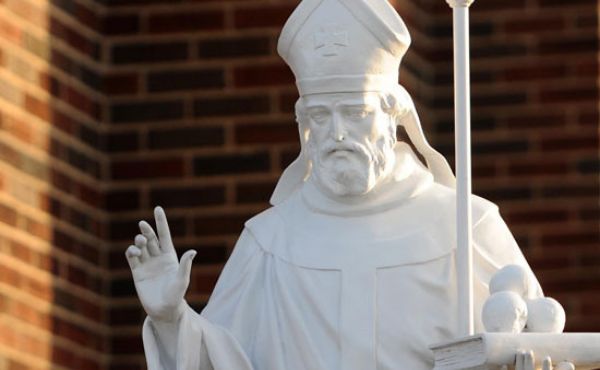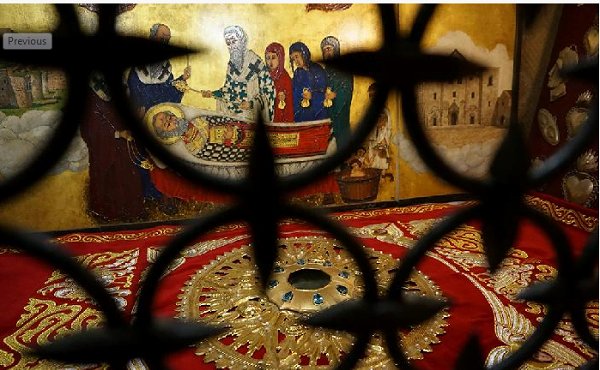During the month of December in 1934, Saint Josemaria recorded in his Intimate Notes: “On the feast of Saint Nicholas of Bari, I promised the Holy Bishop, as I was going up to the altar to say Mass, that if he resolved our financial problems in our House of the Guardian Angel, I would name him administrator of the Work of God.” Alvaro del Portillo commented with reference to this note years later: “thinking that he hadn’t been very generous, he added: ‘Even if you don’t listen to me now, you will still be the Patron of our financial affairs.’”
On 19 January 1935, the Founder wrote to his good friend, Fr. Eliodoro Gil: “Did you know that Saint Nicholas of Bari is no less than the General Administrator of the Work of God? What a job he’s stuck with!”
Many years later, in 1968, Saint Josemaria recalled how the naming of Saint Nicholas as an intercessor for the Work came about: “One day I was at Saint Elizabeth’s, where I was rector. I was about to celebrate Mass and, since I was going through terrible financial straits, I said: Since Saint Nicholas gets people out of financial troubles and finds husbands for prospective old maids...: ‘if you get me out of this fix, I’ll name you intercessor!’ But before going to the altar, I relented, and added: ‘even if you don’t, I’ll name you intercessor just the same.’ The financial need was pressing. Materially perhaps, it didn’t amount to much, but today it would be equivalent to many millions of pesetas.”
One of those present in that 1968 get-together asked: “Father, was the problem solved?”
“Where would you and I be if it hadn’t been? Under a tent somewhere or in a tin shanty...? But I don’t pray for easy miracles. First, I pray that we work, that we support ourselves by our jobs. Then, when we fall short, we ask God for help. I’m not a ‘charismatic’ or a miracle worker. We need to employ the human means, hand in hand with the supernatural. They always go together.”
Amid all their pressing financial needs back in 1934-35, Saint Josemaria never lost his sense of humor.
On 3 January 1935, he filled out by hand, in the name of Saint Nicholas, a form asking for admittance to the DYA Acadamy and Residence in Madrid. The original of this document still exists. The name and surname are given as “Saint Nicholas of Bari (b[ishop] of Myra). Born in Patara, Lycia.” The words “province of” have been crossed out on the form, with “Asia Minor” being recorded there. The date of birth is given as “year 270.” His saint’s days is celebrated on “6 December.” His current residence is “Glory,” and his telephone number is “prayer.” His official titles are: “Bishop of Myra, General Administrator of the Work of God.” Languages known: “all of them, perfectly.” In the space for general knowledge and cultural, artistic and sporting achievements, only one word is found: “God.” Current occupation is “Administrator of the W. of G.” [Work of God]. On the back there is a space for “Remarks,” where we read: “Presented by José María Escrivá.” Following this there is a brief biography of the Saint: “St. Nicholas suffered persecution under Diocletian and Maximian, who sent him into exile. He returned to his episcopal see by order of Constantine. Attended the Council of Nicea. His body is preserved, with great veneration, in Bari (Italy), where it was brought 1087.”
This document was simply an amusing way of recording the new job he had been given as Administrator of the Work a few weeks before.
The title of intercessor meant that the holy bishop’s feast day would be celebrated in all the centers of Opus Dei in a special way, and that they would all have an image of the saint with the invocation: “Sancte Nicoläe: curam domus age” (Saint Nicholas, look after this house).

In 1939, with the Spanish Civil War just having ended, Saint Josemaria entrusted some special responsibilities to the oldest members of Opus Dei. Isidoro Zorzono, who was the oldest in the Work, was charged with looking after its financial concerns: accounts, installations, etc. When beginning his arduous task each day of balancing the account books, Isidoro Zorzono would kiss his crucifix and place it on his work table, and ask the holy bishop to intercede for them.
Zorzano used to joke about whether Saint Nicholas had a beard or not, since he was portrayed in both ways in different images. In 1943, on his deathbed, he remarked jokingly: “One of the first things I want to do on getting [to heaven] is to be asked to be introduced to Saint Nicholas. And then I’ll finally know what his face looks like! … I’ll have to explain a number of things to Saint Nicholas… He doesn’t seem to know how to purchase cutlery at a twenty percent discount,” making reference to a recent purchase. There are also some aspects of the financial needs of the Work “which he doesn’t seem to have understood … it seems to me that he hasn’t truly grasped the problem. I’ll tell him that we don’t want anything for ourselves,” since the only thing they are asking for are the means needed to serve souls.
(Adapted from the article San Nicolás de Bari, intercesor en las necesidades económicas del Opus Dei, by José Miguel Pero-Sanz, in Studia et Documenta (2014), pp. 21-35.)
